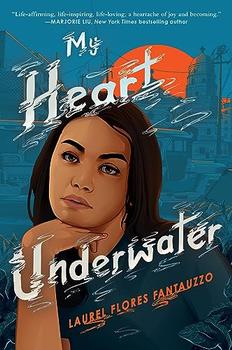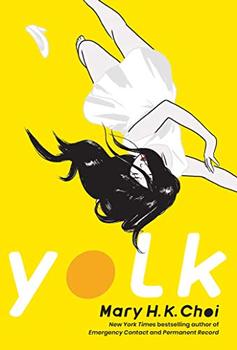Summary | Excerpt | Reviews | Beyond the book | Read-Alikes | Genres & Themes | Author Bio

Sunny Dae has come to terms with his own nerdiness. He's fine with wearing the same unfashionable cargo shorts every day, he's happy to ride his deeply uncool bike around town. Even though he spent years being bullied, he's finally found a bubble of safety and camaraderie with his two best friends, Milo and Jamal, who also happen to be two of the only other students of color at his high school outside Los Angeles in ridiculously wealthy Rancho Ruby (a fictional town that, according to the endpaper map, bears a lot of resemblance to super-exclusive Rolling Hills, California). The three friends have settled into the perfect combination of celebrity and anonymity with their ScreenJunkie (a fictional version of YouTube) channel, "DIY Fantasy FX." In their popular videos, they demonstrate how to construct creative and impressive Live Action Role-Playing (LARP — see Beyond the Book) weapons and props, without actually showing their faces (that would be a bridge too far into the nerd realm). Thanks to his strong sense of self, Sunny no longer compares himself unfavorably to his handsome older brother Gray, who's been making music in Los Angeles as a member of various rock bands since graduating from high school a few years earlier.
But Sunny's comfort in his own skin evaporates quickly when the Sohs, his parents' old friends, move into Rancho Ruby, bringing their beautiful and effortlessly cool daughter Cirrus with them. Cirrus has spent most of her life traveling internationally; she has amazing friends from all over the world — why would she have any interest in Sunny? So perhaps it's no wonder that when Cirrus accidentally mistakes Gray's old room — with its guitars and band posters — for Sunny's, he doesn't correct her. Instead, he finds himself — almost without making the intentional choice to do so — creating a fictional band, the Immortals, with himself as frontman and Milo and Jamal rounding things out. Sunny starts dressing in Gray's old clothes and practicing Gray's old guitar.
Sunny's plan, if you can call it that, seems to work. Cirrus is into him, and even his nemesis at school, football jock Gunner Schwinghammer, is leaving him alone. But things get notably more complicated when Gray abruptly comes home to Rancho Ruby and realizes Sunny's aping his identity. Can Sunny convince Milo and Jamal to follow along with his plan and assume rock star identities (even though they'd rather be prepping for the next LARPing convention)? And, if so, will they keep the con going long enough to take part in an actual performance as part of the school talent show at a legendary Sunset Strip club?
David Yoon's second novel (after Frankly in Love, 2019) continues his exploration of identity and first love. Super Fake Love Song is lighter in tone than Yoon's debut, though it still tackles challenging issues of privilege, ambition and race, among other themes. Sunny is an introspective character, and while he recognizes that his charade to impress Cirrus is, on many levels, wrong, he also senses that his posturing is part of a larger performance of identity that almost everyone engages in: "Everyone liked to call Angelenos fake, because they would do and say anything to make their dreams of stardom come true," Sunny reflects, "As for the rest of us, didn't we all fake it? Just a little bit, every day, at school, at work? Wasn't it more unreasonable to expect someone to be perfectly honest and unwavering and unaccommodating every waking moment of their lives?"
Despite Sunny's rationalization of his own duplicity, he comes to realize that his deception might eventually jeopardize not only his budding relationship with Cirrus but his arguably more important relationships with Milo and Jamal as well. He also develops a more nuanced grasp of his parents and brother as flawed people participating in their own versions of performance and posturing. Although Sunny exhibits genuine complexity and growth, and although the secondary characters are generally well-developed, Yoon's novel could have been even stronger had Cirrus been a more layered character with struggles of her own. Instead, she remains exactly the kind of cool, cosmopolitan woman of the world she appears to be on the surface.
This slight weakness aside, this is a heartfelt and often funny coming-of-age novel that will speak especially to music lovers as well as anyone who has ever felt they had to hide or apologize for their hobbies and passions. Yoon also experiments at times with structure and form in his writing, lapsing into the realm of fantasy for a short stretch, for example, and writing a passage in rhyming couplets. This elevates Super Fake Love Song beyond typical YA romantic comedy fare, making it a thoughtful and romantic novel that will both challenge and satisfy savvy readers.
![]() This review was originally published in The BookBrowse Review in January 2021, and has been updated for the
July 2021 edition.
Click here to go to this issue.
This review was originally published in The BookBrowse Review in January 2021, and has been updated for the
July 2021 edition.
Click here to go to this issue.

If you liked Super Fake Love Song, try these:

by Laurel Fantauzzo
Published 2023
Fans of Adib Khorram and Randy Ribay will love this coming-of-age debut about a Filipina American teen drowning under pressure and learning to trust her heart.

by Mary Choi
Published 2022
From New York Times bestselling author Mary H.K. Choi comes a funny and emotional story about two estranged sisters and how far they'll go to save one of their lives - even if it means swapping identities.
Your guide toexceptional books
BookBrowse seeks out and recommends the best in contemporary fiction and nonfiction—books that not only engage and entertain but also deepen our understanding of ourselves and the world around us.